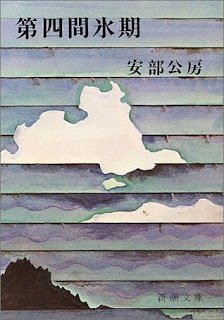


Gogol, Nikolai (Никола́й Васи́льевич Го́голь, Nikolay Vasilyevich Gogol) "The Overcoat. Stories from Russia" (Russian: Шинел/Shinyeliь) (German collection: Gogols Mantel. Erzählungen aus Russland - 1842 et al.
This is a collection of Russian short stories, starting with "The Overcoat" by Nikolai Gogol. As with many of these anthologies, there isn't one with exactly the same stories. But, you can find all these in different other editions which I have tried to find for you.
I always love reading Russian novels. Even these short stories were fantastic. Funnily enough, my favourite was literally the most "fantastic" of them all, "Pkhenz" by Andrei Sinyavsky who wrote under the pseudonym Abram Tertz. Not that it helped him much, the KGB found out who was behind that name and sent him to a labour camp.
When I found the book, I thought it was a book with more than one story by Gogol. It wasn't, there's just "The Overcoat". But the others are all fantastic stories, as well. There was even a Nobel Prize winner among them, Ivan Bunin, who was the first Russian to received that prestigious award.
"The Overcoat" was discussed in our international online book club in October 2018.
Gogol, Nikolai (Никола́й Васи́льевич Го́голь, Nikolay Vasilyevich Gogol) "The Overcoat" (RUS: Шинель/Shinel) - 1842
If you're not sure whether you like Russian literature, this is a perfect example. A simple story of a man who buys an overcoat yet there is so much in it about Russia and its soul. Unbelievable. A story I will probably read again and again.
Famous quote by Dostoevsky "We all come out of Gogol's 'Overcoat". Well said.
Blurb: "A sincere young clerk makes great sacrifices to attain an overcoat of untold value and power."
Dostoevsky, Fyodor "A Gentle Creature" (aka The Gentle Spirit) (RUS: Кроткая/Krotkaja) - 1876
Dostoevsky is one of my favourite Russian authors and this short story is just as great as some of his big novels. In this tale he explains the beginning and end of a relationship and how it all happened. Incredible how much you can put on so few pages.
Blurb: "In this compelling study of despair, based on a real-life incident, a pawnbroker mourns the loss of his wife, a quiet, gentle young girl. Why has she killed herself? Could he have prevented it? These are the questions the pawnbroker asks himself as he pieces together past events and minor incidents, changes of mood and passing glances, in his search for an answer that will relieve his torment.
In this short story, Dostoyevsky masterfully depicts desperation, greed, manipulation and suicide."
Tolstoy, Lew Nikolajewitsch (Толстой, Лев Николаевич) "The Death of Ivan Ilyich" (RUS: Смерть Ивана Ильича/Smert' Ivána Ilyichá) - 1886
I've read this before since it was in Tolstoy's "Collected Works". Again, a very Russian work. An observation about death and its impact not only on the person dying but also on those near to him. There are people who try to enjoy life as much as they can, live it to their fullest, others who give up and have nothing.
If you want to experience Russian literature at its best but don't like long stories, try this one. It's a great one by this brilliant author.
Blurb: "Tolstoy’s most famous novella is an intense and moving examination of death and the possibilities of redemption
Ivan Ilyich is a middle-aged man who has spent his life focused on his career as a bureaucrat and emotionally detached from his wife and children. After an accident he finds himself on the brink of an untimely death, which he sees as a terrible injustice. Face to face with his mortality, Ivan begins to question everything he has believed about the meaning of life. The Death of Ivan Ilyich is a masterpiece of psychological realism and philosophical profundity that has inspired generations of readers."
Chekhov, Anton Pavlovich (Антон Павлович Чехов) "The Lady with the Dog" (RUS: Дма с собачкой/Dama s sobachkoy) - 1899
Oh, the problems of the upper class (today we would say first world problems, I guess) who know nothing about the problems of the little man who has to work tremendously in order for his family not to starve. Often we read about the latter but this is a tale about the former. Great writing.
Again, I have read this story before in another collection "Summer Holidays".
Blurb: "This short story describes an adulterous affair between an unhappily married Moscow banker and a young married woman which begins while both are vacationing alone in Yalta. It is one of Chekhov's most famous pieces of short fiction, and Vladimir Nabokov considered it to be one of the greatest short stories ever written."
Babel, Isaac Emmanuilovich (Исаак Эммануилович Бабель) "Red Cavalry" (RUS: Конармия/Konarmiya) - 1926
"Nine prisoners of war are no longer alive."
A witness oft he civil war when Cossack cavalry invaded Poland after WWI, Isaac Babel describes the attack on a train and the subsequent killing of nine prisoners. This is only on of the stories from this collection which must all be great.
Blurb: "Based on Babel's own diaries that he wrote during the Russo-Polish war of 1920, Red Cavalry is a lyrical, unflinching and often startlingly ironic depiction of the violence and horrors of war. A classic of modern fiction, the short stories are as powerful today as they were when they burst onto the Russian literary landscape nearly a century ago. The narrator, a Russian-Jewish intellectual, struggles with the tensions of his dual identity: fact blends with fiction; the coarse language of soldiers combines with an elevated literary style; cultures, religions and different social classes collide. Shocking, moving and innovative, Red Cavalry is one of the masterpieces of Russian literature."
Kharms, Daniil (Дании́л Ива́нович Хармс) "Interruption" (RUS: помеха/Pomeha)
collection: Russian Absurd and Даниил Хармс. В двух томах. Том 1/Daniil Kharms. V dvukh tomakh. Tom 1
article: Three New Decrees (Авиация превращений/Aviacija prevrashhenij) (original: Собрание сочинений в 3 томах/Sobraniye sochineniy v 3 tomakh)
Another short story from a collection of stories. Very futuristic.
This is only a very small story, three pages long. I have found a few collections of short stories by Daniil Kharms and hope it is in one of them.
To my liking, this was far too short, I would have liked to read more.
Blurb: "A writer who defies categorization, Daniil Kharms has come to be regarded as an essential artist of the modernist avant-garde. His writing, which partakes of performance, narrative, poetry, and visual elements, was largely suppressed during his lifetime, which ended in a psychiatric ward where he starved to death during the siege of Leningrad. His work, which survived mostly in notebooks, can now be seen as one of the pillars of absurdist literature, most explicitly manifested in the 1920s and ’30s Soviet Union by the OBERIU group, which inherited the mantle of Russian futurism from such poets as Vladimir Mayakovsky and Velimir Khlebnikov. This selection of prose and poetry provides the most comprehensive portrait of the writer in English translation to date, revealing the arc of his career and including a particularly generous selection of his later work."
Bunin, Ivan Alekseyevich (Иван Алексеевич Бунин) "In Paris" (RUS: в Париже/v Parizhe) - 1943
collection: Dark Avenues (or Dark Alleys) (RUS: Тёмные аллеи/Tyomnyie alleyi)
Ivan Bunin was an emigrant, he saw a lot of Russian culture from the outside. "In Paris" is a story of Russian emigrants - exactly - in Paris, where he lived for a long time.
As someone who lived abroad myself for a long time, I could relate to many of his allusions. This short story is very interesting and I wouldn't mind reading more by this author.
You will find this story in his collection "Dark Avenues".
Blurb: "One of the great achievements of twentieth-century Russian émigré literature, Dark Avenues took Bunin's poetic mastery of language to new heights.
Written between 1938 and 1944 and set in the context of the Russian cultural and historical crises of the preceding decades, this collection of short fiction centres around dark, erotic liaisons. Love - in its many varied forms - is the unifying motif in a rich range of narratives, characterized by the evocative, elegiac, elegant prose for which Bunin is renowned."
Ivan Alekseyevich Bunin received the Nobel Prize for Literature in 1933 "for following through and developing with chastity and artfulness the traditions of Russian classic prose." He was the first Russian author to be awarded this prize.
Tertz, Abram (Абрам Терц), Abram/Sinyavsky, Andrei Donatovich (Андрей Донатович Синявский) "Pkhenz" (RUS: Пхенц/Pkhenz) - 1959
collection: Fantastic Stories
A science fiction story. Not normally my thing though I have read a few that I really liked. As I did this one. Probably the story that will stay with anyone longest who reads this collection.
I can see the comparison with Kafka though I really prefer this one.
Blurb: "Abram Tertz is the pseudonym of Andrei Sinyavsky, the exile Soviet dissident writer whose works have been compared to fabulists like Kafka and Borges. Tertz's settings are exotic but familiar and as compelling as those of lunatics and mystics. This edition contains the nightmarish 'Pkhentz', a story missing from the first English edition."
I contribute to this page: Read the Nobels and you can find all my blogs about Nobel Prize winning authors and their books here.




























